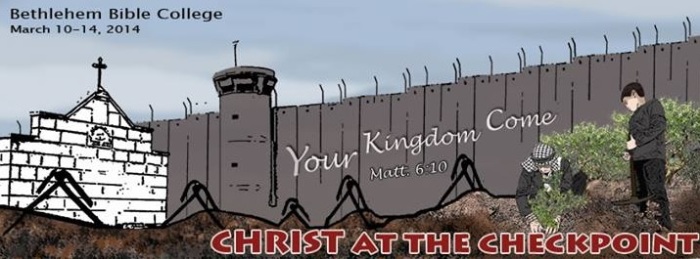Evangelical Conference Claims to Support Both Israel and Palestine But Not All Christians Convinced
A four day Evangelical conference out of Bethlehem focusing on the Israeli/Palestinian conflict kicked off on Monday, even as several Christian leaders spoke out against the event and suggested that it was a veiled attempt to dampen the Church's support for Israel.
The Bethlehem Bible College (BBC), an institution founded by Palestinian Christians in 1979 with the intent to train Arab Israeli and Palestinian pastors, has sponsored Christ at the Checkpoint (CC) bi-annually since its inaugural event in 2010, and according to its mission, seeks to challenge "evangelicals to take responsibility in resolving the Israeli-Palestinian conflict through Jesus' teaching on the Kingdom of God."

Several of the 10 points of the conference manifesto state that "racial ethnicity alone does not guarantee the benefits of the Abrahamic Covenant," "all forms of violence must be refuted unequivocally," that the "the Church in the land of the Holy One, has born witness to Christ since the days of Pentecost," and "must be empowered to continue to be light and salt in the region, if there is to be hope in the midst of conflict."
This year's speakers include Messianic Jewish Leaders, the Palestinian Bible Society director, a Wheaton College professor, the secretary general of the World Evangelical Alliance, the president of Oral Roberts University and former director of the Yale University Divinity School's Reconciliation Program.
Although the BBC denies that its conference has an anti-Israel slant, stating in the conference manifesto that any solution to the conflict "must respect the equity and rights of Israel and Palestinian communities," some remain unconvinced.
Mark Tooley, the President of the Institute on Religion & Democracy, suggested that the event represented "a wider movement, mostly confined to Evangelical elites, to neutralize a key pro-Israel constituency in America, with hopes of moving the U.S. geo-strategically towards neutrality between Israel and its enemies."
"Unfortunately, their perspective ignores the nasty reality of the Middle East, where democracy, human rights and religious liberty at largely confined to Israel and absent nearly everywhere else," he said in a statement.
While Toley conceded that "Evangelicals do need a new, updated public policy perspective regarding the Middle East that stresses human rights for all people," he said that CC would only feed Palestinian "victimology and [ignore] the deep issues among Palestinians that mitigate against responsible statehood."
In a column for JNS.org and reprinted on The Christian Post website, JNS Associate Editor Sean Savage suggested that the event also shared intentions to shift Evangelical thought away from a strictly pro-Israel stance.
"The language of the manifesto clearly paints the Palestinians as victims and Israel as the aggressor.'Here are real injustices taking place in the Palestinian territories and the suffering of the Palestinian people can no longer be ignored,' the manifesto states," Savage argued.
Not all of the conference's speakers, though, are willing to cede that their support for Israel has diminished because of their affiliation with the conference.
Oral Roberts University President William M. Wilson sees his decision to participate with CC as in-line with his own Christian convictions.
"As a believer, I am loyal to my Christian brothers and sisters in Israel, the Palestinian territory, the Middle East and around the world. My attendance at Christ at the Checkpoint is a response to the chance to minister among my Christian family," said Wilson in a statement to CP.
Wilson added that while he does "not agree with every tenant that Christ at the Checkpoint embraces," he "personally supports the Jewish people and their historic right to exist as a state with Jerusalem as their capital. The angel's announcement in Bethlehem remains our only hope for peace on Earth, goodwill to men. I firmly believe only Christ can bring peace to this region."
World Evangelical Alliance General Secretary Geoff Tunnicliffe, said that the WEA, which represents more than 600 million Evangelicals worldwide, has offices open in both Palestine and Israel, and "we're committed to both."
"For the issue of the Holy Land for Evangelicals, as I've traveled the world and talked with people--there is no one position on our eschatology or End Times about the land. There's multiple positions on that," Tunnicliffe told CP. "What there is, is clear support for the idea that Israel has had and does have a special place in God's sovereignty, that they as a nation, people have the right to be and feel secure."
Tunnicliffe said his participation at the conference does not mean that the WEA supports every value that CC espouses, but said that Christians should not be fearful of their fellow believers attending the conference.
"This is not about abandoning Israel. It's about having a fuller conversation," Tunnicliffe said. "We've got to get past this whole full or against mentality. At WEA we're for peace, for people being treated with justice and dignity. We're not trying to be against people."
Both Israelis and Palestinians want to live in a place where they could raise their families and where they could thrive, in peace, without fear of attack, said Tunnicliffe, who added that despite diverse perspectives about the End Times, Christians could all agree with Christ's call to love their neighbor.
"What does it mean for Israelis and Palestinians to love their neighbor? I think that's where we need to have an agreement on because the Scripture demands that," said Tunnicliffe.
During his trip to Palestine and Israel, Tunnicliffe will also be lobbying for Israel and Palestine to formally recognize Evangelical churches. Without formal recognition from the state, pastors often encounter difficulties with regards to marriage, burial and inheritance laws. Tunnicliffe said this was an especially egregious oversight by the government because Evangelicals provided the Holy Land with half the tourists in the region.
Prior to the conference, Tunnicliffe will be meeting with Jewish leaders to hear their perspectives and concerns about CC.
A livestream of the five-day conference is available here.




























